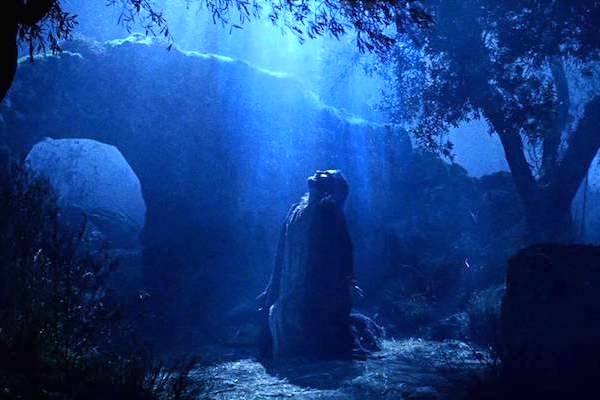LENT 2024: Day 22 - LIFE OF CHRIST

LENT 2024: DAY 22 - Saturday March 9
“There is only one recorded time in the history of Our Blessed Lord when He sang, and that was after the Last Supper when He went out to His death in the Garden of Gethsemane. “And so they sang a hymn and went out to Mount Olivet.” … The gentle lamb opens not its mouth when led to the slaughter, but the true Lamb of God sang with joy at the prospect of the Redemption of the world.
Then came the great warning that they would all be shaken in their confidence in Him. “The Hour” was rapidly approaching about which He had often spoken; when it would strike Him, they would be scandalized… “Tonight you will all lose courage over Me.” (Matthew 26:31) He Who would be the cornerstone of their faith in days to come, now warned that He would also be the stone of their stumbling. He had called Himself their “Good Shepherd”, and now it was the hour of laying down His life for His sheep. Reaching back centuries into their prophecies, He now quoted to them what Zacharias had foretold: “Smite the shepherd, and his flock shall scatter.” (Zacharias 13:7)
Eden and Gethsemane were the two gardens around which revolved the fate of humanity. In Eden, Adam sinned; in Gethsemane, Christ took humanity’s sin upon Himself. In Eden, Adam hid himself from God; in Gethsemane, Christ interceded with His Father; in Eden, God sought out Adam in his sin of rebellion; in Gethsemane, the New Adam sought out the Father and His submission and resignation. In Eden, a sword was drawn to prevent entrance into the garden and thus immortalizing of evil; in Gethsemane, the sword would be sheathed.
The garden was called Gethsemane because of the presence of a press which crushed olives. It was not the first time Our Lord had been in that garden. Jesus and His disciples had often gathered in it… Furthermore, He had often spent the night there.
Judas had already gone forth on his dirty business of betrayal. Eight of the Apostles were left near the entrance to Gethsemane; the other three, Peter, James, and John… He took with Him into the garden… On entering the garden He said to them: “Sit down here, while I go in there and pray.” (Matthew 26:36) Beginning to grow “dismayed and distressed”, He said to the three Apostles: “My soul is ready to die with sorrow; do you abide here and watch with Me.” (Matthew 26:38)
Isaias had foretold that there would be laid upon Him the iniquity of us all. In fulfillment of that prophecy, He tasted death for every man, bearing guilt as if it were His own. Two elements were inseparably bound together – sin-bearing, and sinless obedience. Falling on His face, He now prayed to His Heavenly Father: “My Father, if it is possible, let this chalice pass Me by; only as Thy Will is, not as Mine is.” (Matthew 26:39)
Unbroken was the consciousness of His Father’s love. But on the other hand, His human nature recoiled from death as a penalty for sin. The natural shrinking of the human soul from the punishment which sin deserves was overborne by Divine submission to the Father’s will. The “no” to the cup of the Passion was human; the “yes” to the Divine will was the overcoming of human reluctance to suffering for the sake of Redemption.
This scene is shrouded with the halo of a mystery which no human mind can adequately penetrate. One can dimly guess the psychological horror of the progressive stages of fear, anxiety, and sorrow which prostrated Him before even a single blow had been struck… But there was something else beside the quiet anticipation of the coming struggle which added to the mental sufferings of Our Blessed Lord. It is very likely that the Agony in the Garden cost Him far more suffering than even the physical pain of Crucifixion, and perhaps brought His soul into greater regions of darkness than any other moment of the Passion, with the possible exception of the one on the Cross when He cried: “My God, My God why hast Thou forsaken Me?” (Matthew 27:46)
What Our Blessed Lord contemplated in this agony was not just the buffeting of soldiers, and the pinioning of His hands and feet to a bar of contradiction, but rather the awful burden of the world’s sin, and the fact that the world was about to spurn His Father by Rejecting Him, His Divine Son. What is evil but the exaltation of self-will against the loving will of God, the desire to be a god unto oneself, to accuse His wisdom as foolishness and His love as want of tenderness?
This was the moment when Our Blessed Lord, in obedience to His Father’s will, took upon Himself the iniquities of all the world and became the sin-bearer… He was smitten as a sinner while there was no sin in Him – it was this which caused the agony, the greatest the world has ever known.
As sufferers look to the past and to the future, so the Redeemer looked to the past and to all the sins that had ever been committed; He looked also to the future, to every sin that would be committed… The sin of Adam was there, when as the head of humanity he lost for all men the heritage of God’s grace; Cain was there, purple in the sheet of his brother’s blood; the abominations of Sodom and Gomorrah were there; the forgetfulness of His own people who fell down before false gods was there; the coarseness of the pagans who had rebelled even against the natural law was there; all sins were there… sins too awful to be mentioned, sins too terrible to name.
Once this pure, sinless mind of Our Savior had brought all of this iniquity of the past upon His soul as if it were His own, He now reached into the future… From the North, South, East, and West, the foul miasma of the world’s sins rushed upon Him like a flood; Samson-like, He reached up and pulled the whole guilt of the world upon Himself as if he were guilty, paying for the debt in our name, so that we might once more have access to the Father. He was… preparing Himself for the great sacrifice, laying upon His sinless soul the sins of a guilty world.
In between the sins of the past which He pulled upon His soul as if they were His own, and the sins of the future… was the horror of the present… It was not bodily pain that was causing a soul’s agony; but full sorrow for rebellion against God that was creating bodily pain.
Finding the Apostles asleep the third time, the Savior [said]: “Sleep and take your rest hereafter; as I speak, the time draws near when the Son of Man is to be betrayed into the hands of sinners.” While His friends slept, His enemies plotted… The Hour which He had ardently yearned for was now at hand. In the distance was the regular tramp of Roman soldiers, the uneven and hurried treading of the mob and the temple authorities with a traitor in the front. “Rise up, let us go on our way; already, he that is to betray Me is close at hand.” (Matthew 26:46)

(Chapter 41, pgs. 682 – 696)
+ QUOTES FOR LIFE